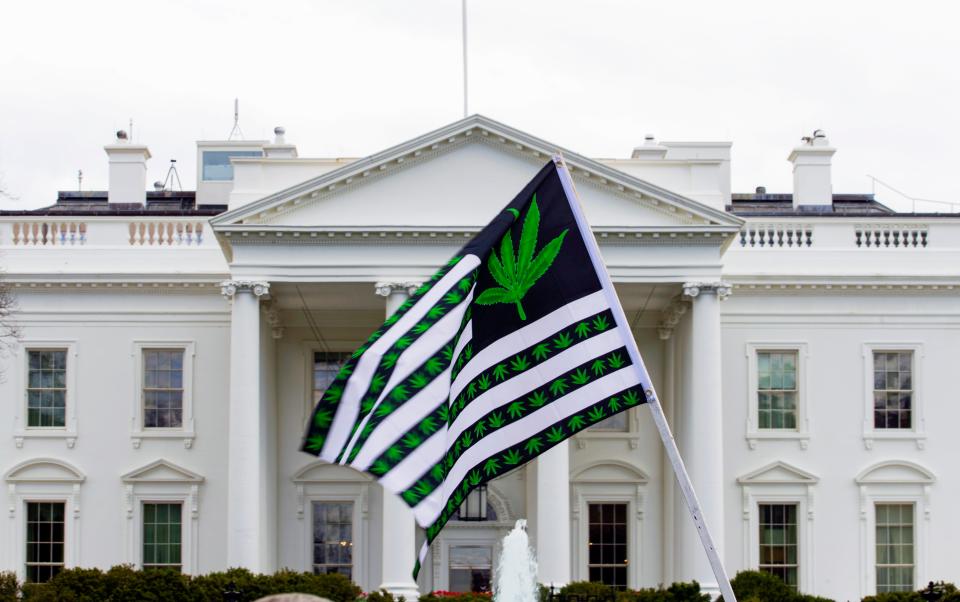Biden pardons marijuana use nationwide. Here's what that means
- Oops!Something went wrong.Please try again later.
WASHINGTON – President Joe Biden announced Friday he's issuing a federal pardon to every American who has used marijuana in the past, including those who were never arrested or prosecuted.
The sweeping pardon applies to all U.S. citizens and lawful permanent residents in possession of marijuana for their personal use and those convicted of similar federal crimes. It also forgives pot users in the District of Columbia. It does not apply to individuals who have been jailed for selling the drug, which is illegal under federal law, or other marijuana offenses such as driving under the influence of an illegal substance.
The implication of Biden's pardon promises to have significant implications, as criminal records for marijuana use and possession have imposed barriers to employment, housing, and educational opportunities. However, the pardons do not apply to people who violated state law, and anyone who wants to receive proof of a pardon will have to apply through the Department of Justice.

Biden issued a similar pardon last year and promised future reforms. This year's proclamation went further in that it forgave all instances of simple marijuana use or possession under federal law, including for individuals who have never been charged. It also expands Biden's previous directive to include minor marijuana offenses committed on federal property.
The White House says thousands of people with federal and district convictions will be eligible for the pardons, which Biden announced three days before the Christmas holiday.
In a statement, Biden said Americans should not be sent to prison solely for using or possessing marijuana. He urged governors to forgive state offenses.
"Criminal records for marijuana use and possession have imposed needless barriers to employment, housing, and educational opportunities. Too many lives have been upended because of our failed approach to marijuana. It’s time that we right these wrongs," Biden said.
More: Many Americans arrested for marijuana won't find relief under Biden's pardon plan
Biden also commuted the sentences of 11 people he said are "serving disproportionately long sentences for nonviolent drug offenses" and would have received lesser sentences if they were charged today.
The Congressional Black Caucus said the pardons are a "positive step forward in addressing long-standing racial disparities in crack and powder cocaine sentencing, which for generations, has disproportionately imprisoned Black Americans."
"It is our hope that clemency be granted to more Black Americans who have been criminalized by the decades-old policies of the War on Drugs era," the group said in a statement.
The American Civil Liberties Union’s Cynthia W. Roseberry, director of the organization's Justice Division, said in a statement that Biden's actions "send a strong message about the power of redemption" and will help to correct past injustices.
But, she said, Congress must change the law to prevent future Justice Department from revoking Biden's directive not to pursue higher sentences for crack offenses.
Marijuana users who want to take part in Biden's program will have to follow an application process set by the Department of Justice to receive a certificate confirming that they were pardoned under the president's broader order if they need to provide proof of clemency for employment or housing applications.
Biden's proclamation states that the attorney general "shall review all properly submitted applications for certificates of pardon and shall issue such certificates of pardon to eligible applicants in due course."
The Biden administration recommended that the DEA reschedule marijuana use to a lower offense earlier this year.
A record 70% of Americans said in an October survey conducted by Gallup that marijuana use should be legalized. It is favored by a majority of Republicans. And it is highly popular among the liberals, Democrats and young Americans whom Biden hopes to inspire to vote for his reelection.
Recreational marijuana use is legal in 24 states and the District of Columbia. Medical marijuana is now widely allowed in the U.S. It is legal in 38 states.
This article originally appeared on USA TODAY: Biden pardons marijuana possession convictions; federal, D.C. crimes

